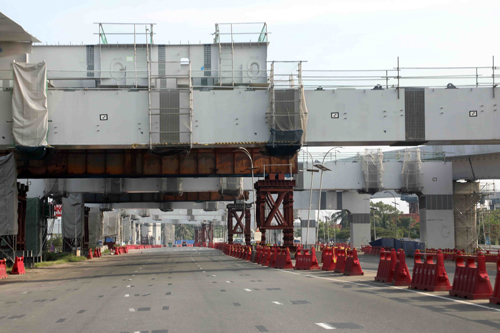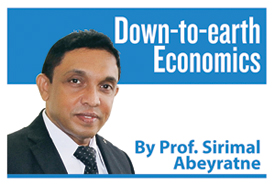Weak immunity
View(s):
Construction suspended in Colombo.
Cabinet decides to suspend or limit imports of all items except pharmaceuticals and fuel.” It was a news item that popped up through media last week. I was not surprised with that and, I even anticipated more. Import controls had already begun two weeks ago with controls over motor vehicle and non-essential imports.
I thought to myself that, if necessary, we can limit even pharmaceuticals and fuel imports. For the former, we need to divert our people into indigenous medicine and healthcare – ayurveda. For the latter, we can get back to bullock carts and push cycles. Those days millions of Chinese people used to ride bicycles, although they rarely do that now. The bicycles they used appear to have got piled-up in the “bicycle graveyards” in millions, while they make use of the modern transport systems.
I am not sure, whether we can manufacture even a bicycle without importing its parts and components, which might now come under import control. Nowadays, if a country needs to manufacture something, it needs to import its raw materials or parts or components. Probably, with new import controls we might be able to learn the other way too – how to make bicycles without importing any parts.
It is not rare to find intellectual opinions arguing that even “COVID-19 is a by-product of globalization”. Therefore, new import controls are hailed by those who think that we should go back to a “non-globalizing” economic system with controls over interactions and transactions with the rest of the world.
Foreign exchange liberalization
In the same week, Sri Lanka made an appeal to Sri Lankans and well-wishers living in Sri Lanka and abroad inviting them to deposit their foreign currency savings in Sri Lanka. In order to facilitate that Sri Lanka introduced far-reaching liberalization measures which include three points: First, these deposits are accepted without any hindrance, which means basically there would be no questions regarding the source of money. Second, the convertibility of these deposits into any currency is guaranteed, which means the deposits can be withdrawn in any currency. Third, all these deposits are exempted from foreign exchange controls and taxes as well as protected from disclosures.
None of these possibilities was there earlier under the existing foreign exchange controls and regulations. If liberalization is the road to globalization, there is apparently liberalization in the foreign exchange market. If regulation is the road to isolation, there is a non-globalization move in terms of new import controls.
In its application, how to maintain a reconciliation between the two sides remains a question. If a depositor wants to spend his money for imports, whether that business comes under import controls or foreign exchange liberalization is not yet clear. Usually, it is foreign exchange relaxation and free trade which go together as in such economies like Singapore and Dubai. But this is a new combination that we need to wait and see its outcome.
What’s this all about?
Both the policy measures and supplementary regulations are to achieve the objective of easing foreign exchange pressure. During the past few weeks, we have seen the weakening exchange rate which is difficult to defend with rising debt obligations and the outflow of foreign exchange from portfolio investments on the payments side. On the receipt side too, fall in export incomes, tourist earnings, and foreign remittances all have contributed to the problem of a foreign exchange shortage.
We can easily attribute the problem to the global lockdown due to the spread of the coronavirus across the world. But we have more to say on this issue. It is confirmed now that the coronavirus affects the people with “weak immunity” much more than the healthier ones. For this reason, the mortality rate of the people who got infected with the coronavirus increases along with their immunity level.
It is the “weak immunity” of the Sri Lankan economy that has made Sri Lanka more vulnerable to the lockdown than most of the other countries in the region. The world economy is still plummeting to an unprecedented recession, which would be more severe than the one we experienced in 2008/09. And Sri Lanka’s vulnerability to the recession is greater than that of many others because we don’t have the buffers. Our immune system is weak.
Economic immunity
Immunity strength of an economy determines its buffer against shocks that has to be built up over a long period of time. We can say that we were at a war for 30 years so that we couldn’t do much.
Well, leave out the war-period and begin with the end of the war since 2009 – more than a decade ago. The period, which was under the rule of two governments, was long enough to bring the economy on track and to strengthen the immune system of the economy.
 It is the building of economic fundamentals that improves the economic immune system against shocks. The most important and inter-related areas that determine the economic fundamentals are internal finance, external finance and economic growth.
It is the building of economic fundamentals that improves the economic immune system against shocks. The most important and inter-related areas that determine the economic fundamentals are internal finance, external finance and economic growth.
Internal finance is the improvement in government’s tax revenue and spending ability. In an unprecedented spread of pandemic crisis like this, countries naturally expand far-reaching public spending to fight against the pandemic as well as for fiscal stimulus to mitigate its adverse economic impact – to support and sustain production, to provide incomes for the unemployed, and to maintain aggregate demand. While Sri Lanka’s ability to provide a significant fiscal stimulus was extremely weak, the approved government expenditure to fight the COVID-19 was limited to Rs. 500 million.
The second area of building the fundamentals was external finance – particularly, the ability of the country to generate foreign exchange. Due to weak export growth and foreign direct investment inflows, the country has been depending on external borrowings even to pay for previous borrowings. When the global lockdown hit the meagre foreign exchange sources resulting in a sharp fall in the exchange rate, and when the foreign debt obligations are around the corner, there is no buffer to cover up. Import controls, debt moratoria, and further borrowings are now unavoidable.
Finally, it is the rate of economic growth which is fundamentally important even for improving both the above areas – internal and external finance. While the economic slowdown over the years had been Sri Lanka’s experience over the years, the real rate of GDP growth that the country has achieved in 2019 was reported last week as 2.3 per cent – the lowest after 2001.
Opportunities in difficulty
Among the countries in the world, Sri Lanka has also chosen the toughest way of controlling the spread of COVID-19 – by imposing curfews. There might be differences in opinions, but two factors made it necessary: The first is the weak health capacity of the country to handle not more than a few hundred cases a day. The second is the nature of the ill-disciplined social-distancing and weak rules and regulatory framework within which things would be taken very lightly. But it is true that the economic and social cost of the tough methods would be difficult to bear.
While handling the issue in such a way, we should not forget that “there are opportunities in difficulties” as well. Why not we look into the question as to why Sri Lanka was unable to build up its economic immunity in terms of government finance, external finance, and economic growth over the past decade. The crisis would present an invaluable opportunity to correct some of our deep-rooted errors and weaknesses so that the economy would be on fast track during forthcoming post-COVID times.
(The writer is a Professor of Economics at the University of Colombo and can be reached at
sirimal@econ.cmb.ac.lk).



